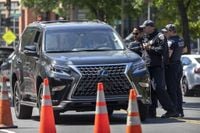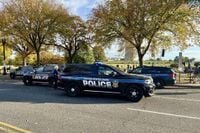In a move that has sent ripples through the nation’s capital, President Donald Trump’s administration enacted a sweeping change to law enforcement policy in Washington, D.C., resulting in a dramatic drop in violent crime and sparking intense debate among residents, business owners, and officials. The changes, which include a federal surge of officers and a less restrictive police pursuit policy for the U.S. Park Police, have been credited with making the city safer—at least according to some. Others, however, worry about the long-term implications of a heavy federal hand on local policing.
On August 25, 2025, the White House issued an executive order relaxing the rules around police pursuits for the U.S. Park Police, who patrol many of the city’s most iconic spaces. The new policy, outlined in Executive Order 14333, directed the Director of the National Park Service to hire additional Park Police officers in D.C. to help maintain public safety and order. The order emphasized that Park Police should “ensure enforcement of all applicable laws within their jurisdiction, including the Code of the District of Columbia, to help maintain public safety and proper order.”
Interior Secretary Doug Burgum, who oversees the Park Police, described the change as a major shift in federal law enforcement strategy. During a recent Cabinet meeting, Burgum recounted his surprise upon learning that officers had previously been unable to pursue suspects who fled from traffic stops. “I was shocked to find out when we were talking to them that, ‘you pull somebody over and they just drive away and you can’t pursue them?’ and they said, ‘No we can’t,'” Burgum said. “We got that rule changed in 24 hours because of President Trump’s leadership.”
Burgum went on to explain the immediate impact of the new rules: “The next night they had so much fun, they pulled people over, they chased them, they stopped them,” he said. “The bad guys in the cars said, ‘You’re not supposed to chase us. You’re breaking the rules.'” According to the Interior Secretary, the rapid policy revision was intended to send a clear message to would-be offenders.
The Fraternal Order of Police, which represents Park Police officers, issued a statement confirming that “Senior Leadership from the Fraternal Order of Police, the United States Park Police, and the Department of the Interior — on behalf of directives from the White House — negotiated an interim vehicle pursuit modification to our current General Order.” The union emphasized the need for “levelheaded judgment and safety for the public and our officers,” noting that the interim policy would remain in effect until a permanent one could be negotiated. “We support a policy that responsibly balances enforcement with safety and look forward to its permanent implementation,” the statement read.
These changes did not occur in isolation. As part of a broader federal intervention, the Trump administration deployed National Guard troops and federal agents to the streets of Washington, D.C., beginning on August 25, 2025. This move, aimed at supporting local law enforcement, was quickly followed by a measurable drop in crime rates. Mayor Muriel Bowser, a Democrat, acknowledged the impact during a press conference on August 27, 2025. “We greatly appreciate the surge of officers that enhance what MPD has been able to do in this city,” Bowser said, highlighting an 87% reduction in carjackings during the 20-day period of the federal surge compared to the previous year.
The mayor also noted, “Violent crime has fallen by 45% when compared with the same period in 2024, while crime overall dipped 15%.” She later posted the full statistics on her X account (formerly Twitter), underscoring the extent of the change. “We know that when carjackings go down, when use of gun goes down, when homicide or robbery go down, neighborhoods feel safer and are safer,” Bowser added.
For many residents and business owners, the increased security presence has been a relief. Indu Bhatia, who runs a liquor store half a mile from the White House, told the New York Post, “All my employees, including me, we feel much more safe, and even our customers feel really happy when they walk into our store.” Bhatia recounted how frequent robberies had forced her to invest heavily in security, but the recent drop in crime has made a noticeable difference. “All we can do as a small business owner is protect yourself,” she said, adding that the improved performance of local police had been a welcome change.
Mike, a 22-year-old Johns Hopkins University student, saw the federal takeover as a sign of renewed commitment. “It shows a renewed interest by the Trump administration to move around resources and maybe tackle the problem in a different way,” he remarked. National Guard troops stationed around the city reported positive interactions with locals, with one Guardsman saying, “We’ve had a lot of people saying ‘I’m glad you’re here doing what you’re doing — a lot of fist-bumps and selfies.'”
Mahesh, a government employee from Maryland, noticed faster police response times and a greater sense of security. “Recently I went to the White House and saw someone had left a bag outside and right away a cop went out there and was asking people whose bag it was. [The police] are very alert and I feel like it’s very secure,” he said. “I think Trump is doing right taking care of the city.”
Even so, not everyone is convinced the federal intervention is the right approach. Christian Meyers, a longtime D.C. resident and nonprofit worker, voiced his concerns to the New York Post: “Having the Guard here is idiotic. I just think it’s going to be another Kent State. It’s going to happen eventually, if they don’t get out of here. They’re going to pull a gun on somebody and shoot somebody that’s underage, a kid.” Courtney, who works in government affairs, labeled the troop deployment a “publicity stunt,” arguing that the security presence is concentrated in areas suited for photo opportunities rather than neighborhoods most affected by crime.
Despite the controversy, the numbers are striking. According to crime statistics posted by the police union, citywide crime was down 11% in the 14 days following the federal surge, with robberies dropping 42%, assaults with deadly weapons down 13%, carjackings plummeting 85%, car thefts reduced by 24%, violent crime down 25%, and property crime falling 10%. The city also experienced a nearly unprecedented 12-day streak without a murder, a rarity for a city that has long struggled with high rates of violence.
Washington, D.C., has been one of America’s most violent major cities, with a murder rate that outpaces Chicago and is nearly seven times higher than New York City. While violence had been trending downward in 2025, certain crimes—such as carjackings and vehicle thefts—had soared since the pre-pandemic era, with carjackings up 241% and vehicle thefts up 143% between 2019 and 2024. Even with recent improvements, the city’s murder rate remains 12% higher than it was in 2019.
Some observers believe the crackdown has led to more quality-of-life charges being processed in the courts, while others, like DC Metro worker Alex, see the visible presence of National Guard troops as a deterrent. “It does get rid of a lot of the foolishness inside malls, Metro stations, places of business, just seeing them,” Alex said. “You have a dude that might come in here and act the fool but instead of doing that he sees [National Guard troops] and says ‘I’m not gonna do nothing’ — it does make some people think twice.”
As Washington navigates this new era of public safety, the debate over federal intervention, police tactics, and civil liberties is far from settled. For now, the city’s streets are quieter, its residents divided, and its future uncertain as leaders weigh the balance between security and freedom.





